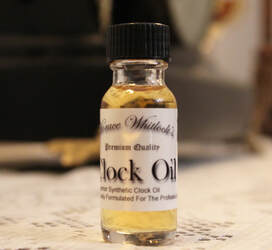 Clocks have been an essential part of human life for centuries, with the earliest examples dating back to ancient times. However, with the intricate mechanisms and movements of these timekeeping devices, they require regular maintenance to keep them functioning smoothly. This is where clock oil comes in - a specialized lubricant that has played an important role in the history of clocks. Clock oil is a type of lubricant specifically designed for clock mechanisms. It is typically a lightweight mineral oil that is formulated to be non-gumming, non-evaporating, and long-lasting. The purpose of clock oil is to reduce friction between moving parts, preventing wear and tear, and helping to extend the life of the clock. The history of clock oil can be traced back to the early days of clock making. In the 14th century, clocks were typically powered by weights and gears, and early clockmakers would use a variety of lubricants, including animal fat, tallow, and vegetable oil, to keep the movements running smoothly. As clockmaking became more sophisticated, and clocks became smaller and more portable, the need for a specialized lubricant became apparent. In the 18th century, clockmakers began using a type of oil made from sperm whale blubber, which had a high viscosity and was ideal for lubricating the small, intricate movements of clocks. However, with the rise of the industrial revolution in the 19th century, the use of whale oil became increasingly unsustainable, and alternative lubricants were sought. One of the most significant developments in clock oil history came in 1848 when an American chemist named Charles Goodyear discovered vulcanized rubber. This led to the development of synthetic lubricants, which were made from petroleum products and had superior lubricating properties. By the 20th century, the use of synthetic lubricants had become widespread in the clockmaking industry. New formulations were developed that were specifically designed for different types of clocks, including wall clocks, grandfather clocks, and pocket watches. These specialized lubricants helped to improve the accuracy and reliability of clocks, which became increasingly important in a world where accurate timekeeping was essential for industry, transportation, and communication. Today, clock oil is still an essential part of clock maintenance. Although there are now many synthetic lubricants available, some clockmakers still prefer to use natural oils, such as those derived from vegetable sources like jojoba and coconut. We have seen that these oils will gunk up, dry out and collect dust faster than a good quality Synthetic oil. However, regular maintenance and lubrication with a good quality synthetic oils specifically formulated for clocks cannot be overstated. In conclusion, the history of clock oil is a fascinating story of innovation and technological progress. From the use of animal fat in ancient times to the development of synthetic lubricants in the 19th century, clock oil has played an essential role in the maintenance and functioning of clocks. As we continue to rely on accurate timekeeping in our daily lives, clock oil remains a vital component in ensuring that our timekeeping devices run smoothly and accurately.
0 Comments
Leave a Reply. |
AuthorBob Bartow Archives
January 2024
Categories |
 RSS Feed
RSS Feed